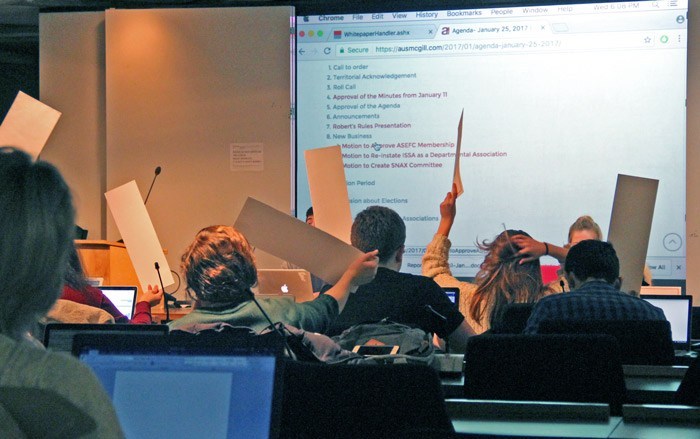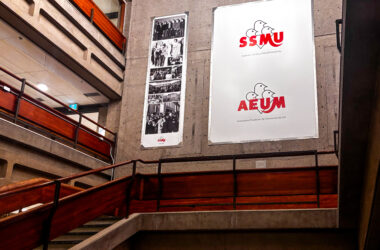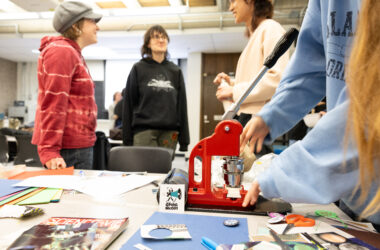The Arts Undergraduate Society (AUS) held a Legislative Council meeting on Jan. 16 to address recurring electoral issues, some of which were noticeable sources of tension among movers.
Punitive electoral measures
When running for office, AUS candidates currently have a ‘three-strike process’ for infractions of the electoral bylaws and the society’s constitution. AUS President Maria Thomas proposed replacing the process with a more adaptable demerit system.
Under the new system, transgressors would collect demerit points for committing specific infractions, including engaging in deception, bribery, or posting over another candidate’s campaign material. Elections AUS may decide to issue a formal warning based on an individual’s demerit points or even have the candidate disqualified.
With respect to the new system, Joshua Werber, vice-president (VP) External of the Religious Studies Undergraduate Society (RSUS), proposed that Elections AUS should be required to instruct candidates on how to appeal its punitive measures.
“Simply because a lot of students may not know how,” Werber said. “Even though it is a simple process, it might seem murky.”
Online Voting
The Quebec Studies Student Association (QSSA) attempted to opt-out of AUS’ online elections system and was given permission to hold its elections internally. QSSA VP External Anaïs Lepine-Lopez argued that, given that they only represent approximately 10 departmental minor students, her department’s size should be taken into account when deciding whether or not online voting ought to be implemented.
“An online platform is not effective for us,” Lepine-Lopez said. “We’re a small department.”
A compromise deal passed unopposed. QSSA was permitted to hold in-person elections but only if it conducted online voting in unison, thereby assuaging concerns raised about setting an ambiguous precedent.
The move for internal elections became a contested issue when the Classics Student Association (CSA) pointed out that it had been denied a similar request in the past. CSA VP External Sara Merker expressed her confusion as to what standard procedure is.
“I tried to pass basically the same exact motion at our last meeting, and it got denied,” Merker said. “We have a department where you can fit everyone in a room to vote together, and that was kind of the point, and, so, I just don’t know whether taking this on a case-by-case basis with mixed results is going to be an issue.”
Thomas expressed doubt as to the suitability of internal voting altogether, seeing it as a potential hindrance for some voters.
“I just like don’t think this is the best idea for accessibility,” Thomas said. “I do think, though, that [the motion] should be amended, if the movers are open to it, to both […meet] in a room and [have] an online option because you just, can’t anticipate someone being sick [on election day] or something like that.”
Anticipating low voter turnout, executive members of the Religious Studies Undergraduate Society (RSUS) moved to hold interviews for filling the department’s executive positions instead of holding an election. They ultimately decided, however, to rescind their motion and send it to a subcommittee for further review.
Arts Senator Madeline Wilson dismissed the RSUS’s fears.
“If you think that [an election] is too much work; being a student executive is also work,” said Wilson. “If someone doesn’t want to run for an election, maybe they would not be up for the responsibilities of that position.”
The RSUS’ request will be re-examined at the next AUS council meeting, following the subcommittee’s report.
AUS Legislative Council will reconvene on Jan. 30 at 6:00 pm.









